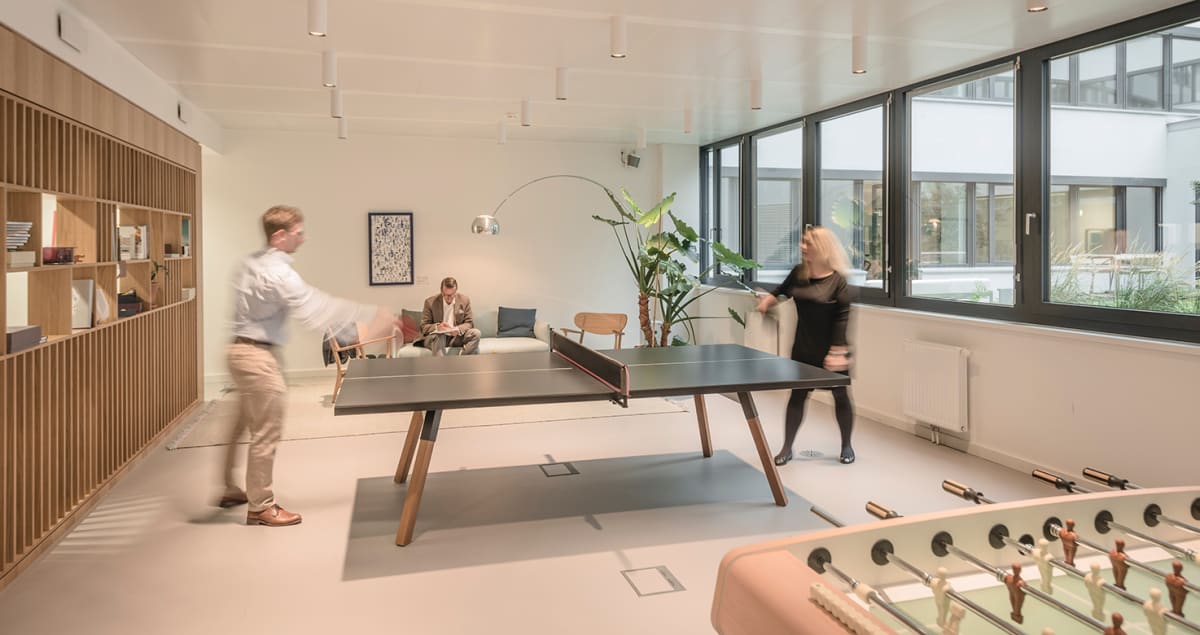The pandemic has made it difficult for some employees to carve out boundaries between their personal and professional lives. But the rise of hybrid working and the availability of 'third places' are helping them overcome this challenge, making flexspace a wise investment for franchisees.
American sociologists Ramon Oldenburg and Dennis Brissett first defined ‘third places’ in 1982 as crucial public spaces for people to interact, gather, meet and talk within their own neighbourhoods. But with the majority of modern professionals traditionally required to commute to dedicated city centre HQs on a daily basis, their connection to the area in which they live has eroded. Until now…
Thanks to the rise of hybrid working, where people can work from a combination of their company HQ, their home and a local coworking space, we are seeing the rise of the 15-Minute City. This is an urban planning concept whereby residents have access to everything they need - from schools to flexspace - within a 15 minute walk or cycle from their homes. The result is that suburban communities are flourishing.
Unlike when people were working from home every day during periods of lockdown, hybrid working means people can create more delineation between personal and professional life, but without compromising on flexibility. From the point of view of potential franchisees looking to invest in this long-term trend, there is huge opportunity for growth.
The importance of third places as a social space that brings workers together to collaborate, converse and network cannot be underestimated. IWG’s flexible workspaces are designed with collaboration in mind, and other companies are transforming their HQs to accommodate their new purpose in the new world of work.
Spotify, for example, is overhauling its office spaces to strike a better balance between collaboration and focused work and WeTransfer has removed half of its desks to create more meeting spaces, workshop rooms and recording studios.
Multinational enterprises are also adopting the hybrid model at scale, providing their employees with access to flexspace near to their homes. NTT and Cisco are just two examples of companies that have partnered with IWG this year, giving their combined more than 300,000 strong workforces access to IWG’s global network of flexible workspaces.
Now, even the French government is recognising the importance of third places for the country’s post-Covid economic recovery. It is investing €130m in the development of third places and the plan includes the creation of 100 “local factories” to boost regional economies hit hard by the pandemic. These will act as shared workshops where craftsmen, entrepreneurs and small businesses can collaborate.
Funds will also be used to develop third places as centres for professional training for businesses, as well as the learning of important knowledge such as digital skills. Indeed, according to France Tiers-Lieux (the French National Association of Third Places), 60% of third places have training activities, which can be accredited professional training, peer-to-peer learning and learning by doing.
The main aim behind the government’s investment and strategy is to regenerate medium-sized towns and rural areas, positively transforming communities and local economies. Given that 75% of third places in France are also currently coworking spaces, it is an opportunity for both existing and prospective flexspace franchise partners to be a part of a social and economic revolution across the world’s seventh-largest economy.
The potential benefits for businesses are huge – not least the impact these spaces can have on boosting productivity. In fact, providing a third place for staff is a concept that was explored by Henry Ford, founder of the Ford Motor Company, almost a century ago. He discovered that when he enforced break periods on his employees, there was a significant increase in productivity.
Ultimately, empowering employees to work from third places including flexible workspaces nearer to home will build a happier, more productive workforce, says IWG Founder and CEO Mark Dixon.
He argues that it “gets them off the road, stops their time being wasted and ends the long commutes that can disrupt family life,” adding: “I predict that in 15 years – or 10, possibly even in five years’ time – people will look back on our pre-pandemic routines and say, ‘How on earth did we use to work like that?’”
Are you ready to meet the demand for flexible office space in 2022? Find out more about IWG’s franchising partnerships today.






